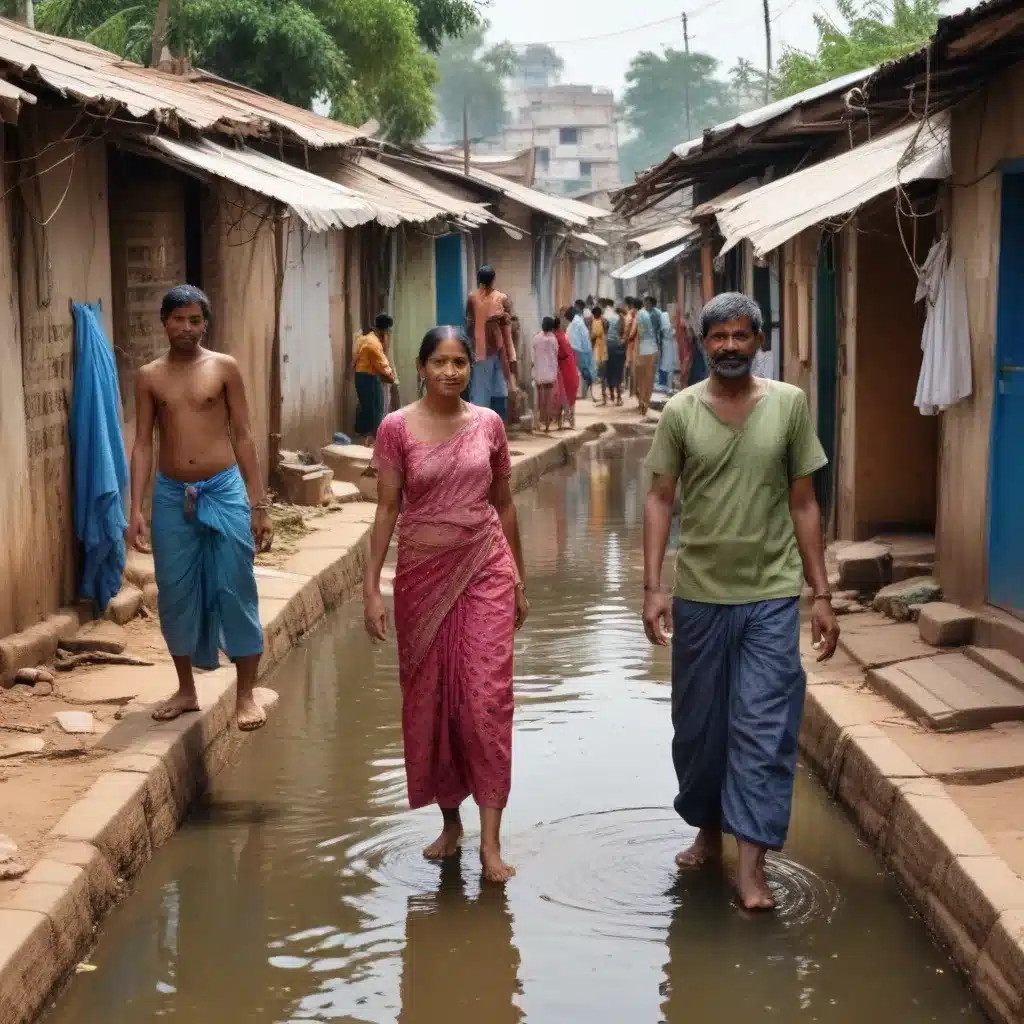
The Urgent Need to Strengthen WASH Infrastructure and Services
The sprawling slums of Hyderabad, India, are home to millions of the city’s most vulnerable residents. Lacking access to reliable water, sanitation, and hygiene (WASH) services, these communities face a constant battle against water-borne diseases that can devastate families and neighborhoods. As climate change heightens the risks of extreme weather, disease outbreaks, and infrastructure failure, it is critical that we work to enhance the resilience of WASH systems in Hyderabad’s slums.
Climate-driven impacts, such as flooding, droughts, and rising temperatures, exacerbate the existing WASH challenges in these marginalized areas. Contaminated water sources, inadequate waste management, and poor hygiene practices create an environment ripe for the spread of cholera, dysentery, typhoid, and other deadly waterborne illnesses. The compounding effects of poverty, weak institutions, and limited community engagement further undermine the ability of slum residents to withstand and recover from disease outbreaks.
Mapping the Vulnerabilities in Hyderabad’s WASH Landscape
To build resilience, we must first understand the specific vulnerabilities faced by Hyderabad’s slum communities. A comprehensive assessment of the WASH landscape reveals several key areas of concern:
-
Unreliable Water Access: Many slums rely on intermittent and unsafe water sources, such as shared standpipes or contaminated groundwater. Frequent water supply disruptions and quality issues heighten the risk of waterborne diseases.
-
Inadequate Sanitation Infrastructure: Open defecation, poorly maintained pit latrines, and limited access to sewerage networks are common in slum areas. This lack of proper sanitation leads to the contamination of water sources and the spread of pathogens.
-
Poor Hygiene Practices: Limited access to handwashing facilities, low awareness of hygiene importance, and cultural barriers hamper efforts to promote good hygiene behaviors among slum residents.
-
Weak Institutional Capacity: Local government agencies often struggle to provide equitable WASH services, coordinate emergency response, and engage with marginalized communities. Insufficient resources and technical expertise impede their ability to maintain and improve WASH infrastructure.
-
Disconnected Community Engagement: Slum residents frequently feel disconnected from decision-making processes and lack the means to advocate for their WASH needs. This disconnect undermines the sustainability and responsiveness of WASH interventions.
Strategies for Enhancing WASH Resilience in Hyderabad’s Slums
To address these vulnerabilities and build resilient WASH systems, a multifaceted approach is required. This approach should involve a combination of infrastructure improvements, institutional capacity-building, and community empowerment initiatives.
Strengthening WASH Infrastructure and Services
-
Expanding Reliable Water Access: Invest in the development of sustainable water supply networks, including groundwater recharge, rainwater harvesting, and the expansion of piped water systems. Ensure equitable distribution and reliable access to clean water.
-
Improving Sanitation Systems: Construct decentralized wastewater treatment facilities, upgrade communal toilet blocks, and promote the use of eco-friendly sanitation technologies. Integrate these systems with comprehensive waste management plans.
-
Promoting Hygiene Practices: Implement large-scale hygiene education campaigns, distribute hygiene kits, and establish community-based handwashing stations. Engage local leaders and influencers to champion improved hygiene behaviors.
Enhancing Institutional Capacity and Coordination
-
Strengthening Local Governance: Empower local government agencies to plan, implement, and monitor WASH services effectively. Provide training, resources, and technical assistance to improve their capabilities.
-
Fostering Multisectoral Collaboration: Facilitate partnerships between government, civil society organizations, and the private sector to leverage diverse expertise and resources for WASH resilience.
-
Improving Emergency Preparedness: Develop robust emergency response plans and early warning systems to ensure the continuity of WASH services during disease outbreaks and natural disasters.
Empowering Slum Communities
-
Engaging Residents in WASH Decision-Making: Establish participatory platforms that enable slum residents to voice their concerns, contribute to WASH planning, and monitor service delivery.
-
Building Community-Based WASH Management: Support the formation and capacity-building of community-based organizations (CBOs) to manage and maintain WASH infrastructure at the local level.
-
Fostering Advocacy and Accountability: Empower slum residents to advocate for their WASH rights and hold local authorities and service providers accountable for the quality and equity of service delivery.
Leveraging Partnerships and Funding for Sustainable Impact
Achieving resilient WASH systems in Hyderabad’s slums requires sustained investment and collaborative efforts. Partnerships with development agencies, philanthropic organizations, and the private sector can unlock the necessary financial resources and technical expertise. Innovative financing mechanisms, such as blended finance and performance-based contracts, can help channel investments to high-impact WASH interventions.
Moreover, aligning WASH resilience strategies with broader urban development and climate adaptation plans can ensure that slum communities are not left behind. By integrating WASH considerations into the city’s overall development agenda, we can create synergies and maximize the long-term impact of our efforts.
Conclusion: Towards a More Resilient and Equitable WASH Future
Strengthening the resilience of WASH systems in Hyderabad’s slums is not only a matter of public health, but also a fundamental issue of social justice and environmental sustainability. By addressing the critical vulnerabilities in water access, sanitation, and hygiene, we can empower these marginalized communities to withstand and recover from water-borne disease outbreaks and epidemics.
Through a holistic approach that combines infrastructure improvements, institutional capacity-building, and community engagement, we can work towards a future where all residents of Hyderabad, regardless of their socioeconomic status, have access to safe, reliable, and equitable WASH services. By doing so, we can create more resilient and inclusive communities that are better prepared to face the challenges of climate change and other emerging threats.
The Joint Action for Water initiative is committed to supporting these efforts and collaborating with local stakeholders to enhance the resilience of WASH systems in Hyderabad’s slums. By leveraging our expertise, resources, and networks, we can contribute to building a more water-secure and disease-resilient future for all.

